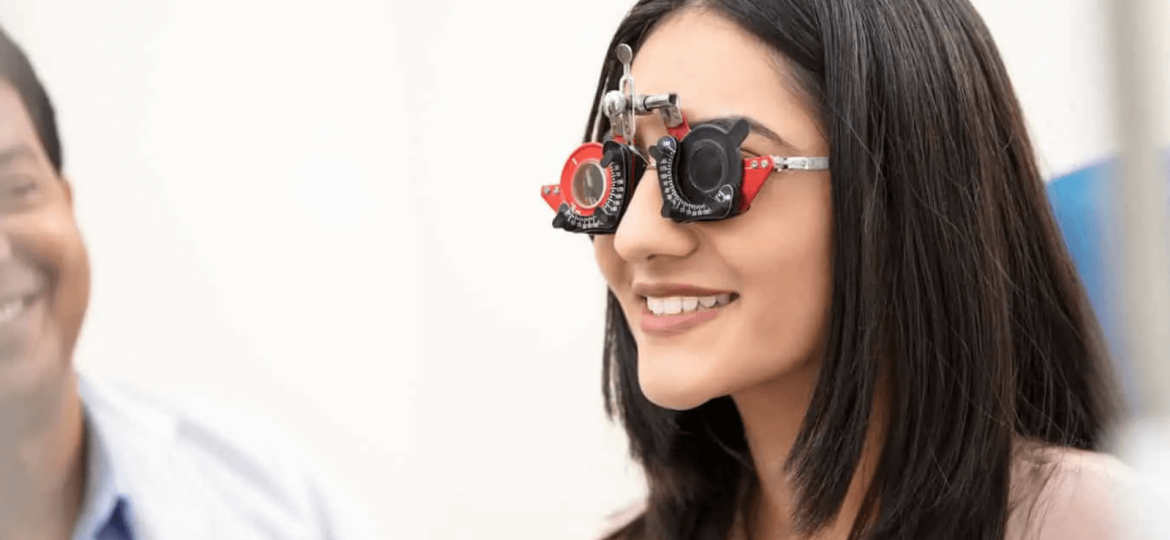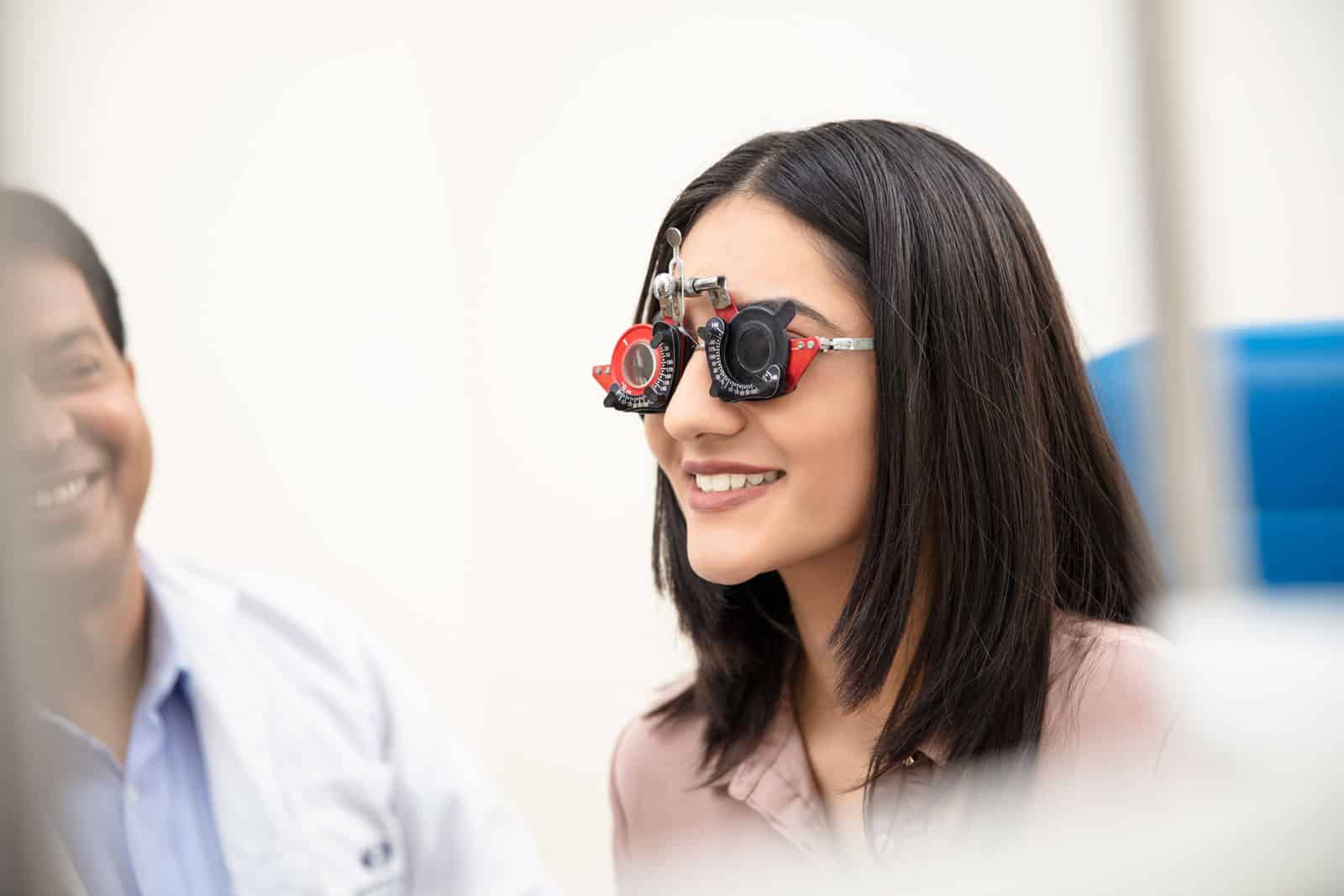
Vision Correction

Imagine a key that not only preserves but also enhances our ability to see clearly – that’s the essence of vision correction. In this blog, we let you know the significance of clear vision, explores common sight hiccups, and unveils a spectrum of treatments dedicated to keeping your vision at its best.
What is vision correction?
Vision correction is a broad term encompassing various techniques and tools aimed at improving visual acuity. Whether you’re dealing with nearsightedness, farsightedness, astigmatism, or presbyopia, there are solutions available to address these common vision issues.
Common Vision Problems
-
Myopia (Nearsightedness):
Myopia, or nearsightedness, results in blurry vision for distant objects while close-up vision remains clear. Genetic and environmental factors contribute to its development. Effective management includes prescription eyeglasses, contact lenses, and innovative myopia control techniques like orthokeratology. Regular eye exams are crucial for early detection and personalized intervention to ensure optimal vision.
-
Hyperopia (Farsightedness):
Hyperopia, or farsightedness, poses challenges for close-up vision. Unlike myopia, hyperopia occurs when the eyeball is too short or the cornea has insufficient curvature, causing light to focus behind the retina instead of directly on it. The causes of hyperopia are often a combination of genetic factors and environmental influence. Fortunately, there are effective correction methodologies available. Prescription eyeglasses or contact lenses can be used to adjust the way light enters the eyes, improving focus. Understanding the causative factors and correction options is key to addressing hyperopia and ensuring clear vision for various activities, from reading to everyday tasks.
-
Astigmatism:
Astigmatism is a common vision condition resulting from an irregular shape in the cornea or lens of the eye, causing light to focus unevenly on the retina. Astigmatism leads to distorted or blurred vision at all distances. Often occurring concurrently with these refractive errors, astigmatism’s symptoms may manifest as eyestrain, headaches, and difficulties with clarity. The irregular corneal shape scatters light, preventing a single focal point. Fortunately, corrective measures abound, with prescription eyeglasses or contact lenses crafted to compensate for the irregularities and ensure proper light refraction. For a more lasting solution, refractive surgeries such as LASIK reshape the cornea, offering a permanent correction for astigmatism. Regular eye check-ups are crucial for timely detection and effective management of astigmatism, promoting clear and comfortable vision.
-
Presbyopia:
Presbyopia is a common age-related vision condition affecting the eye’s ability to focus on close objects, typically emerging around age 40 due to the natural aging process. As the eye’s lens loses elasticity, tasks like reading become challenging, leading to symptoms like eyestrain and headaches. Corrective lenses, including reading glasses or bifocals, offer effective management by providing distinct prescriptions for close and distance vision. Regular eye exams are crucial for monitoring and addressing presbyopia, ensuring individuals maintain clear vision as they age.
Vision Correction Diagnosis & Treatment
Vision correction encompasses a meticulous diagnosis and tailored treatment approach. Eye care professionals utilize diagnostic tools to precisely identify vision problems, paving the way for personalized treatments. Options range from traditional eyeglasses and contact lenses to advanced solutions like LASIK surgery, implantable collamer lenses (ICL), and orthokeratology (Ortho-K). Embracing natural vision correction techniques and a healthy lifestyle complements these interventions. Regular eye check-ups are vital for early detection and ensuring optimal vision and eye health.
Eyeglasses as a Vision Correction Option
Eyeglasses are a classic and versatile option for vision correction, addressing common issues like nearsightedness and farsightedness. Available in various styles and lenses, they cater to individual preferences and fashion choices. From single-vision to multifocal lenses, eyeglasses offer a practical and stylish solution for clear vision. Regular eye check-ups ensure up-to-date prescriptions, ensuring continued optimal visual acuity.
Contact Lenses for Vision Correction
Contact lenses provide a discreet and convenient alternative for effective vision correction. These thin, curved lenses sit directly on the eye’s surface, offering a natural field of vision without the constraints of eyeglasses. Ideal for those with active lifestyles or aesthetic preferences, contact lenses come in various types, including daily disposables, extended-wear lenses, and specialty contacts for conditions like astigmatism or presbyopia. While offering practical advantages, such as unobstructed peripheral vision and compatibility with various physical activities, it’s crucial to consider factors like comfort, maintenance, and suitability for your specific vision needs.
Regular consultations with an eye care professional ensure the proper fit and prescription, maximizing the benefits of contact lenses for a seamless and clear visual experience.
LASIK and Refractive Surgery for Vision Correction
LASIK and refractive surgeries redefine vision correction, utilizing advanced techniques to reshape the cornea for enhanced visual clarity. LASIK, short for Laser-Assisted In Situ Keratomileusis, employs a laser to precisely modify corneal curvature, correcting common refractive issues such as myopia and astigmatism.
This vision correction procedure boasts quick recovery times and diminished reliance on glasses or contacts. Other procedures like Contoura Vision, SILK, and SMILE offer tailored alternatives. Deciding on refractive surgery is a personal choice, and consulting with an eye care professional is crucial for eligibility assessment and understanding potential outcomes. Explore the transformative benefits of these surgeries for lasting visual freedom.
Implantable Collamer Lenses (ICL)
Implantable Collamer Lenses (ICL) represent an innovative solution for vision correction. Unlike conventional contacts, ICL involves surgically implanting a biocompatible lens inside the eye to correct refractive errors like nearsightedness. This procedure offers distinct advantages, preserving the natural corneal shape while providing clear and sharp vision.
This vision correction method suits those with moderate to severe nearsightedness, ICL ensures minimal discomfort and a quick recovery. Reversible and effective, it is a compelling option for individuals seeking lasting visual improvement without relying on glasses or contacts. Consultation with an eye care professional is crucial to assess candidacy and explore the transformative benefits of ICL surgery.
Orthokeratology (Ortho-K)
Orthokeratology, commonly known as Ortho-K, is a non-surgical vision correction technique that involves wearing specially crafted contact lenses overnight. These lenses gently reshape the cornea, temporarily correcting refractive errors like myopia (nearsightedness). The result is clear vision during the day without the need for glasses or daytime contact lenses.
This Vision correction is Popular among those with active lifestyles, Ortho-K provides the freedom to participate in sports and other activities without the hindrance of corrective eyewear. Regular consultations with an eye care professional are essential to assess progress, ensure the lenses’ proper fit, and optimize the benefits of Ortho-K for clear and comfortable vision.
Choosing the Right Vision Correction Method
Choosing the right vision correction method is a nuanced process that involves navigating various factors to arrive at an optimal decision. This intricate decision-making journey requires an exploration of numerous influencing factors, ranging from the specific nature of one’s vision issues to personal preferences and lifestyle considerations. Understanding the array of available vision correction options, including eyeglasses, contact lenses, and refractive surgeries.
This section offers comprehensive guidance on how to navigate these considerations, empowering individuals to make informed choices aligned with their unique needs and preferences. By tailoring the decision-making process, individuals can embark on a personalized path toward a clear and comfortable vision that resonates with their circumstances.
FAQs
What should I consider when choosing a vision correction method?
When selecting a vision correction method, factors like prescription, lifestyle, and budget play crucial roles. Explore options like glasses, contact lenses, or refractive surgeries after consulting with an eye care professional. Prioritize comfort and long-term vision goals for a personalized and effective solution.
What are vision correction methods?
Vision correction methods refer to diverse options for improving eyesight. These include glasses, contact lenses, and refractive surgeries. To find the best solution tailored to your needs, consult with an eye care professional who can consider factors such as your prescription, lifestyle, and preferences.
Can vision correction procedures be used to treat cataracts or other eye conditions?
Vision correction procedures are not typically used to treat cataracts. Cataract treatment involves surgical removal of the cloudy lens and replacement with an artificial lens.
How do eyeglasses correct vision?
Eyeglasses correct vision by using specially crafted lenses to modify the way light enters the eyes. These lenses compensate for refractive errors such as nearsightedness or farsightedness, ensuring that light focuses accurately on the retina. For optimal vision correction, consult an eye doctor to receive a customized prescription that suits your unique visual requirements.
How to treat low vision problems?
Managing low vision requires personalized strategies and aids. Consult with an eye care professional to explore options like magnification devices, specialized lighting, and assistive technology. Vision rehabilitation services offer training to enhance daily living skills. Consult an eye specialist for solutions like magnifiers and lighting. For effective support, schedule a consultation with Centre For Sight—an expert in vision care.
